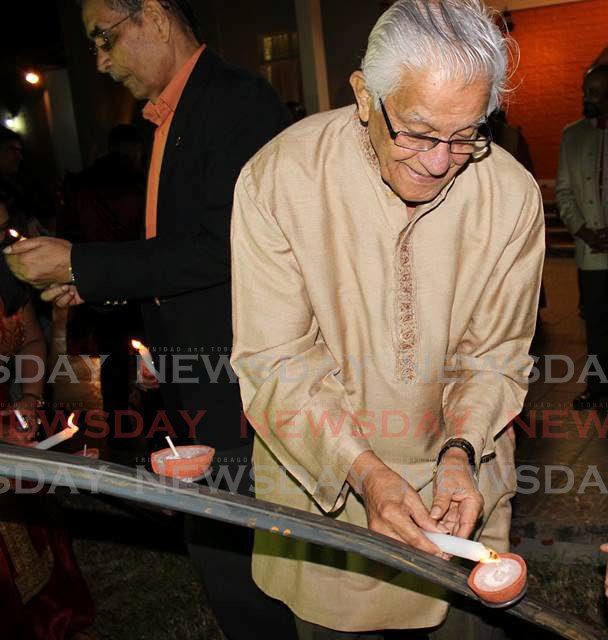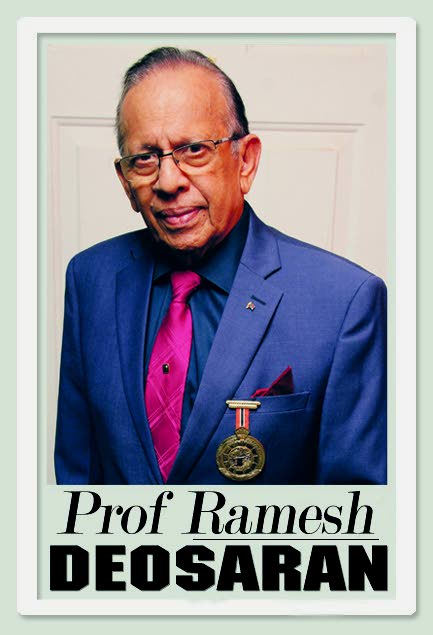Panday, morality, hypocrisy

Of all the metaphors, retorts and inuendoes the enigmatic former PM Basdeo Panday made in his multi-sectoral career, the one I like best is “politics has its own morality.”
Why? Mainly because, like the Italian political philosopher Niccolo Machiavelli, Panday sharply recognised how political practice really is as compared to how it ought to be. In fact, if you condemn political hypocrisy, you condemn much of politics itself.
Though he disturbed the peace, Panday was right. Political morality is not absolute. It cannot be. Even Thomas Hobbes, violently against political corruption, deception and hypocrisy, felt obliged to admit that at least some of it is inevitable. For one thing, politicians face the masses’ immoral inclinations, a multitude of self-interest groups and political competitors wherein truth becomes a casualty in seeking to serve all. Moral flexibility is adopted for political survival.
Politics has a noble purpose until it is necessarily placed in the hands of politicians, the practitioners. Politicians themselves find it almost inevitable that politics should have its own morality – some abuse, cutting corners, bending rules, not illegal but claimed to be in the “public interest.” A “necessary evil,” it is called. This is different from malicious hypocrisy used for personal wealth and political cover-ups.
Explaining the dilemma in 2016, Panday said: “At the time, you take the best decision you can including influences of all kinds, of forces around and the circumstances you’re in.”
I had planned to write about contempt of court and the stipulated penalties, but I saw Larry Lalla, SC, post recalling a 2016 interview with Panday’s hair-raising comments on the passing of former PM Patrick Manning at age 69. The newspaper headlined Panday’s speech: “Bas praises for Manning: We are a nation of hypocrites.”
He said: “TT people wait until you die to say things, we are a nation of hypocrites.” He added while the current Constitution “is bound to encourage the politics of race, the only way forward is to change the Constitution, but neither the Prime Minister or Opposition leader wants constitution reform.” There were mixed responses.
Having complained that the current UNC is not the one he formed, he predicted in 2016: ”The UNC will remain in opposition for 15 years if it contested the 2020 polls under the present leadership.”
When asked about Dr Roodal Moonilal’s possible UNC leadership, Panday replied “Dr Moonilal doesn’t have the political know-how and attitude. I doubt he has it.
"It takes quite a combination to lead a party successfully. The (UNC) party can only rise again if members have free, fair polls.”

That was in 2016. Now while Dr Moonilal can take care of himself, Panday’s “hypocrites” reference shook the ground.
About 25 years ago, before Panday’s remark and after much hearing, seeing and reading in Parliament, I earnestly declared in the Senate: “Hypocrisy is the art of a civilised society.” It helps keep society and its institutions oiled. The press, seemingly surprised, published it.
In higher places, hypocrisy is nobly called “diplomacy.” Keep relations running smoothly for a “bigger purpose.” Handshakes, smiles and dinners mask true feelings. Honest men sign peace treaties today, make public promises, but war is declared next day.
At 83, in 2016, Panday declared: “I’ll never give up the political struggle. It would be treasonable not to attempt to make my country a better place.
"Manning felt the same. I intend to be around for a long time.”
He died last week “with his boots on.”
Quite a political teaser, Panday’s “politics has its own morality” remark shook up the political landscape. Some honourable politicians and commentators, armed with political correctness, felt he was implicitly accepting “political immorality.” Political hypocrisy is briefly defined as “political behaviour that contradicts what a politician is or what he or she says or does.”
Anthropologists say we are steeped in the oral traditions. Calypso, picong and talk tents are used to expose, even ridicule, our hypocrisies. We have more than our share of sweet-talkers, scammers and smartmen who pretend to be what they are not. You can listen to them, even pretend you believe them. Be a defensive hypocrite; but no further. They can be quite expensive.
Look, in our world of real politics, if a politician ventured to speak his mind, the truth, to the electorate, he would not last long. So he backs back and hypocritically considers that “politics is the art of the possible,” “the art of compromise” – all far from the Student Companion’s definition: “Politics is the science of government.”
There is very little that is “scientific” about politics. And hence many an honest politician suffers from cognitive dissonance – living with mentally opposing ideas, beliefs or behaviours.
Political hypocrisy brings some relief, especially when it is politically rewarded. But too much of it could make a politician mentally unsteady. Sissel Bok and then Michael Lewis and Carolyn Saarni illustrate this in their respective books, Lying, and Lying and Deception in Everyday Life. Lying is used as a cover for hypocrisy.
The early practice of hypocrisy itself comes from Greek theatre, where actors took on various roles quite different from their true selves. (Hypocrisy comes from Greek
hypokrisis – acting.) Panday, of course, had acted in many roles, including some in movies.
Numerous books, like David Runciman’s 2018 Political Hypocrisy: The Mask of Power, have explored the phenomenon and its serious implications for democracy and electoral politics, where truth and transparency are mandatory. The comparison is made, for example, between a party’s manifesto of promises and what the politicians actually do afterwards.
At another level, the slick art of “doublespeak” has become professionalised: saying one thing but meaning something else. Communications specialist Prof Kathleen Hall Jamieson, on the media’s unwitting role in perpetuating political hypocrisy, calls it “dirty politics.”
The politician mischievously attacks his critic’s character rather than the substantive issue. Media technology and mind-bending campaign sophistication perpetuate the hypocritical doublespeak practice. William Lutz added, “Pollsters and market researchers have given us more doublespeak in politics than ever before.”
In his 1996 book Doublespeak, Lutz cited other examples of political deception. After promising “no new taxes” in 1991, President George Bush raised money by calling it “receipts proposals,” “user fees,” “revenue increases,” “facility charges,” etc.
Of course, apart from politics there are other places of hypocrisy. Panday noted that the practice of law also has its own morality. It is often called ‘tactics” or “strategy.” Quite often, it is not a matter of being untruthful. It is an attempt not to hurt, not to embarrass. This has led to a classification of “minor hypocrisy and major hypocrisy.”
Can you imagine a lady asking you how she looks when you are really thinking she is “ugly” in a misfitting dress? Or a prime minister telling a counterpart he has evidence showing his or her country’s politicians are corrupt? Or a party member telling his or her leader that some party members have become corrupt? Hypocrisy in parties helps keep things stable, but sometimes a few find the moral price too high. They resign.
Like many of us, Panday was not perfect. But we should remember when, with his enterprising AG, Ramesh Lawrence Maharaj, he gave us the Freedom of Information Act, the Equal Opportunities Act and strengthened joint select committees. The death penalty was activated for drug-trafficking murderers. His attempt to establish the most multi-ethnic labour and political leadership got stalled.
Do them before they do you, he once quipped. Then, “An election is civilised war.” He understood what was meant by “the enemy of my enemy is my friend.”
Tragically, his government collapsed when ministers Maharaj, Trevor Sudama and Ralph Maraj raised allegations of party corruption. Panday denied knowledge.
It was left to public judgement, as his life is today.

Comments
"Panday, morality, hypocrisy"